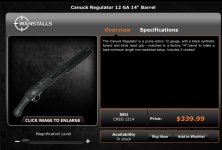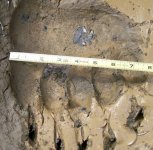Peter & Judy wrote:
Carrying a firearm outside of hunting season without the express purpose of hunting may be illegal, but more so is culturally unacceptable in Canada.
http://www.rcmp-grc.gc.ca/cfp-pcaf/faq/index-eng.htm
Thanks for sharing this, Peter and Judy. I didn't see any information in the link you provided about the legality of carrying a firearm, out of season, without the express purpose of hunting. If that's accurate—if it's prohibited—it ends my consideration of a firearms option for the Inside Passage. Similarly, I would like to hear more about cultural norms in Canada—and coastal B.C. in particular—relating to guns and bear protection.
In my opinion, if U.S. residents are unwilling to honor Canadian cultural values, we have no business entering your country.
Thanks for the interest in Canadian cultural values when it comes to firearms in this country. I know that this is not a political forum and I will try to avoid politics in this. I will try to pass on my understanding of US history as best I understand it, my education background in part included studies in university in Canadian Studies, so my knowledge of Canadian history and politics is deeper. Canada and the U.S. are two very similar countries in many ways, as we are both parts of the new world, settled mostly by Europeans who took the land away from the native peoples that were here first. But there are differences in our history that make us different. We both had the same colonial parent England. But in 1776 when the 13 American colonies decided to separate, they did so by violent revolution and warfare. Some American colonists who wished to remain under the English crown, moved north to the Canadian Colonies, and became the United Empire Loyalists. The disputes over Canadian Colonies, between the French and the English, was settled in 1759 at the Battle of the Plains of Abraham in Quebec. The English won, the French lost and decided it wasn’t worth fighting any more battles over a few beaver pelts. By 1867 the English Crown decided along with the Canadians that we might all be better off if the Canadians would take over governing themselves. We remained a part of the British Commonwealth of Nations and Queen Elizabeth II is still our Queen. We don’t need a president because we have a Queen and thus avoid a lot of politics every four years.
During and around this time between American Independence and Canadian Confederation our histories were very different. The US was still technically at war with England and did attack Canada in 1812 in an attempt to take the Canadian Colonies away from England. The English/Canadian Army retaliated and burned the Whitehouse. During this time the southern US States had an economy based on slavery, where as there was no slave trade to speak of in Canada. The US also adopted the 2nd amendment in 1791 to allow for militias to counter the threats of the English armies and in case there was an uprising amongst the slaves. The American civil war was one of the bloodiest wars of the 19th century and left deep scares in the US, that I see as still being there within some citizens of your country. During this time Canada lived in relative peace. In the second half of the 19th century there was a great movement to settle the west and the US waged many bloody wars with the Indians and also wiped out the great buffalo herds. Settlement of the Canadian west came later, basically after the American west was full. Typically in the US the settlers came first and the law came later. In the Canadian west the law arrived before the settlers. The North West Mounted Police was formed in 1873 and marched west the next year. The fear was that now as the American west was filling up, there would be a move by American settlers to occupy the lands of Canada. There was also a need to clear out the American Whiskey Traders who were wrecking havoc with the Indians, sign treaties with the Indians and open the land for orderly settlement. The NWMP were originally going to be called the NWM Regiment, but there was a fear that given that name, the very experienced US Cavalry would want to test their fighting skills. So they decided to name them the NWM Police instead. They were also dressed in the very British Red Serge uniforms to make them more visible to both the Indians and the Americans. By the time the settlers arrived, the Indians were settled on their reservations, there were police posts in all of the regions and settlement went forward in a very peaceful and orderly manor. This is why there are so few western movies based on the Canadian experience, as compared the American west. In reality it was boring here and the cowboys would rather play polo that go to the saloon.
One more example was the Klondike Gold Rush in 1898. When gold was discovered in Yukon it set a mad rush of men looking to get rich. Most of these men were Americans. When they arrived at the Canadian border, the mounted police were there to make sure they didn’t get into trouble. At the top of the Chilikoot Pass and the White Pass the Mounties checked that they had a ton of supplies each, enough food and clothing to survive a year in the Canadian north. When they arrived at Dawson City they were met by NWMP’s commanding Officer Sam Steele who confiscated all of the Americans guns. There was little violence in Dawson, the saloons, casinos and brothels were all closed on Sundays. This was a contrast to other mining boom towns south of the border like Tombstone, Arizona, where a ‘Boot Hill’ was a common part of the landscape.
So with the different history of our country where for the most part we have been able to live safely and peacefully, we have developed a different attitude towards firearms. Canadians are avid hunters, we will go to war when necessary, but we have never started a war. Ownership of firearms is highly restricted, but if you are hunter or rancher like myself, long guns are not too hard to obtain. Handguns, assault rifles and other military style firearms are either highly restricted or prohibited. Most Canadians feel no need to own firearms for personal protection. Gun violence and violent crime is quite low in our country. Most of the handguns used by criminals are smuggled in from the US. This is one of the reasons that the Canadian Border Agents are so tough on importation of guns into Canada by visitors. There are no open carry permits available to the general public, this is limited to law enforcement, or those that might need protection in their jobs like armored car drivers. To purchase firearms or ammunition you need to take training and be registered as a firearm owner. Police checks and permits are required for all firearm purchases. Canadians for the most part trust our government and police.
As far as the culture of carrying firearms in Canada, I rarely see guns except in hunting season. When not in use they must be properly stored in locked metal cabinets or with trigger locks, unloaded. Firearms are not legal in our National Parks, Provincial Parks and Marine Parks. They are legal on private lands and most public lands and can be carried for protection there if there is a threat from dangerous wildlife, this does not include handguns or restricted firearms. In very remote areas you may be more likely to see people with guns, but in more populated areas most people do not carry guns in the wilderness. My nephew, who works in BC forestry industry on the west coast of BC as a forester, often alone and on foot, only carries bear spray, as do all of his co-workers.
I have spent most of my life in Grizzly bear country and I have never carried a firearm for protection from man or beast. I started carrying bear spray perhaps 15 years ago, as well as bear bangers. I have had about 30 bear encounters in the wild. I have thought hard about whether I would carry a firearm into the wilderness, but I have decided that with my limited firearm experience it might prove to be more of a hazard than a safety device. In a close range surprise attack by a grizzly, I feel my chances would be better with bear spray than with a gun. I have no intention or desire to ever kill a bear and would only want to deter the attack. I am after all intruding in the bear’s home territory and maybe I deserve what I get for being there. Grizzly bears are on the endangered species list, human beings are not. Every year 2 or 3 people are killed by bears in Canada and I feel that if I use my head, make my presence known to the bear, turn around when necessary and carry bear spray and bangers, my odds are pretty good of survival.


